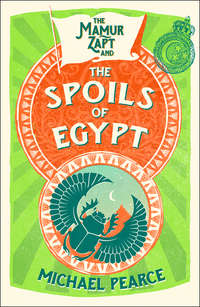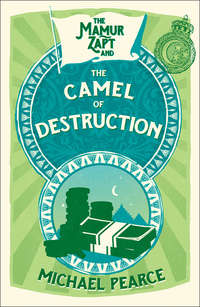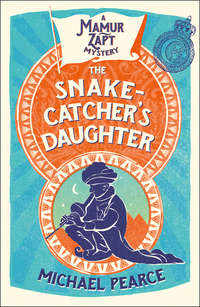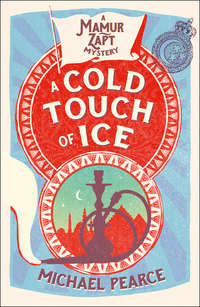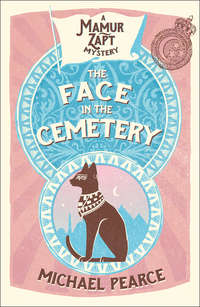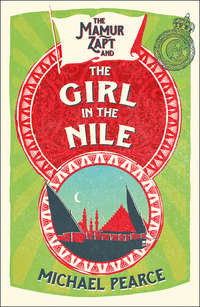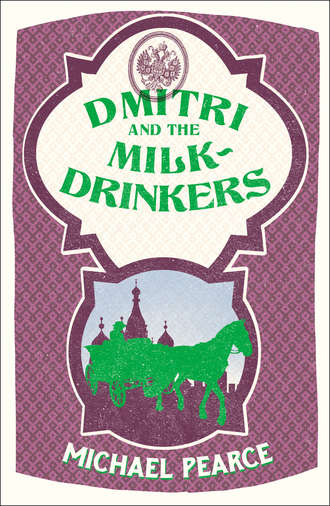
Полная версия
Dmitri and the Milk-Drinkers
‘What are you going to do now?’ he asked.
Novikov looked at his watch.
‘Nine o’clock,’ he said. ‘Nothing more tonight. It’s too dark. Tomorrow we’ll search the grounds. Then the park. First thing, though, as soon as it’s light, we’ll have people go through the building again, before the courts open. We may have missed something, you never know. And you wouldn’t want people to come in and find …’
‘Indeed not.’
‘But,’ Novikov went on, ‘I won’t do it myself.’
‘No?’
‘I’ll be in the back yard. I want to have a good look in the mud. Before the wagons start coming. Care to join me, Dmitri Alexandrovich?’ he asked maliciously.
Not at first light but at a decent hour, Dmitri called on the Semeonovs and was shown into the drawing room. A few moments later the Semeonovs joined him.
‘Dmitri Alexandrovich Kameron,’ he said bowing. ‘Examining Magistrate. At your service.’
‘He looks very young!’ said Olga Feodorovna, inspecting him critically.
‘Yes, he does,’ said her husband. ‘I don’t call that good enough! Is that the best they can do?’ he demanded, looking at Dmitri. ‘A man like me deserves something better. Peter Ivanovich at least!’
‘Peter Ivanovich is, indeed, occupying himself with the case, although, of course, formally it is the Examining Magistrate – ’
‘Formally?’ said Semeonov. ‘What do I care about “formally”? Don’t come the petty bureaucrat with me, you young puppy! What’s your name?’ he demanded threateningly.
‘Kameron. As I have just told you,’ said Dmitri, seething.
‘Well, Mr Examining Magistrate Kameron, you can run back to the Court House and tell them I want to see somebody different on the case, someone a bit more senior! I call this an insult. I can see I’m going to have to have a word with someone higher up, not just in Kursk, either. Prince Dolgorukov – ’
‘Kameron?’ said his wife, ‘Did you say Kameron?’
‘I did.’
‘That is not a Russian name.’
‘My God!’ said Semeonov. ‘Are they sending us foreigners now?’
‘They are not,’ said Dmitri, stung. ‘My family has been Russian for two hundred years. My great-great-grandfather served the Tsar – ’
‘Kameron?’ interrupted Olga Feodorovna. ‘What sort of name is that?’
‘Scottish. My great-great-grandfather – ’
‘Served the Tsar, you say? In what capacity?’ interrupted Semeonov.
‘He built the Tsarina’s palace.’
‘Yes, but what rank?’
‘For his services he was admitted to the dvorianstvo.’
‘Really?’ said Olga Feodorovna.
‘A rank which my family has been proud to retain!’ said Dmitri, fired up.
And would have been prouder still if anything, money for instance, had gone with it.
‘Well, now, look – ’ began Semeonov.
‘Dmitri Alexandrovich!’ said Olga Feodorovna, putting out her hand and smiling sweetly. ‘How kind of you to call! Charmant!’ she said to her husband. ‘But why haven’t you been to see us before?’ she said to Dmitri. ‘My daughter would so like – oh, my daughter!’ she cried, collapsing in tears.
‘Now, now, my dear – ’
‘Madam! Madam!’ cried Dmitri, supporting her to a sofa. ‘You must not give way! Don’t assume the worst! I’m sure she’s all right.’
‘You think so?’ whispered Olga Feodorovna, looking up at him through her tears.
‘I am sure!’ cried Dmitri, carried away.
‘And you will find her?’
‘I will find her! I promise you!’
‘You will? Oh, Dmitri Alexandrovich!’
‘I will search the park myself.’
‘Oh, Dmitri Alexandrovich! You will stay to lunch, won’t you?’
It would have been unsociable to refuse. And over lunch he learned some more about the strange girl who had sought his help in the Court House.
A sweet girl, charming. Dmitri could believe that. Tender, passionate. Good qualities, in Dmitri’s view, especially in women. Serious – serious about what?
‘She used to read,’ said Olga Feodorovna.
And not your French romances, either! Or, at least, not just your French romances.
‘Real books!’ said Semeonov, nodding significantly. ‘Thick ones!’
‘On …?’
Hospitals, said Semeonov. Children, said Olga Feodorovna. The poor.
‘Oh, yes,’ said Semeonov. ‘The poor.’
For some reason Dmitri began to feel depressed.
‘And church,’ said Olga Feodorovna. ‘She used to go to church.’
‘But stopped,’ said Semeonov.
Stopped?
‘A girlish whim!’ said Olga Feodorovna.
When was this?
‘About three months ago,’ said Semeonov.
‘I pleaded with her,’ said Olga Feodorovna. ‘I asked her to think how it would look.’
But she wouldn’t be persuaded?
‘Well,’ said Olga Feodorovna, ‘you know girls.’
Any reason?
‘Doubts,’ said Semeonov.
Doubts? What sort of doubts? Religious ones?
The Semeonovs wouldn’t say that.
‘She was having a difficult time,’ said Olga Feodorovna. ‘You know; girls.’
Dmitri hadn’t the faintest idea what she was talking about.
‘Moody,’ said Semeonov.
‘Well, yes,’ Olga Feodorovna had to admit, you could say that. A passing phase, though. And didn’t Dmitri Alexandrovich think that made young women more interesting?
Oh, yes, Dmitri was sure of that.
‘I knew you would understand,’ said Olga Feodorovna softly.
It was a pity Dmitri Alexandrovich had never met her.
Dmitri was sure about that, too. In fact, he couldn’t think how it was that he had come to miss her.
‘Well, she didn’t get about much,’ said Olga Feodorovna. ‘I tried to encourage her to, but she preferred to stay at home.’
‘Reading,’ supplemented Semeonov.
‘You see!’ said Olga Feodorovna, making what had once been a pretty moue. ‘Serious!’
Not many friends, then?
‘Only a few,’ Olga Feodorovna conceded. ‘In the best families, of course.’
Men friends?
‘Oh, Dmitri Alexandrovich! We’re not like St Petersburg, you know!’
Nevertheless –
‘Frankly,’ said Semeonov, ‘there’s no one here you’d encourage her to meet.’
‘Except yourself, Dmitri Alexandrovich,’ said Olga Feodorovna, smiling.
‘When you get on a bit,’ said Semeonov. ‘In your career, I mean.’
But had there been anyone particular? A tendresse, perhaps?
‘Oh, Dmitri Alexandrovich!’ said Olga Feodorovna roguishly.
‘No,’ said Semeonov shortly.
Servants came and cleared the dishes away. Over the coffee, Dmitri said:
‘And what exactly was Anna Semeonova doing in the Court House yesterday?’
‘A fad!’ said Semeonov, frowning.
‘A whim!’ said Olga Feodorovna.
‘But what …?’
‘She wanted to see a court in action,’ said Semeonov. ‘Well, I ask you!’
‘Such a serious girl!’ said Olga Feodorovna.
‘It’s all these books she’s been reading. I’m all for giving girls education,’ said Semeonov, ‘but you can go too far.’
‘I told her we could receive the lawyers socially,’ said Olga Feodorovna. ‘Only that wasn’t what she wanted.’
‘She wanted to go and see,’ said Semeonov. ‘I fixed it up with Smirnov. I didn’t want anything too … well, you know what I mean. She’s only a young girl.’
‘Smirnov?’ said Dmitri. ‘That would be contracts, then.’
‘I thought that was safest. Nothing too juicy. Smirnov said that it would be so boring she’d never want to go again.’
‘I see. So there was nothing specific she particularly wanted to see, it was just the working of the courts in general?’
‘She wanted to see the working of justice, she said.’
In that case, thought Dmitri, why go to the Law Courts?
2
Dmitri considered the fact that she was a serious girl a major indictment. He knew what serious girls were like. Especially in Kursk.
Besides, with her parents’ permission, he’d taken a look in her room and seen the books: heavy, figure-filled stuff and all in German. Dmitri felt guilty about German. Germany was where a lot of the most advanced social thinking was going on and as a committed Westernizer, he should have been keeping himself au courant. He found the German language, however – or, at least, the German language as written by heavy German academics – hard going. So, apparently, had Anna Semeonova. She had persevered, nonetheless. That was another thing that Dmitri held against her.
The books gave a clue as to the direction of her seriousness. She was not serious about novels, she was not serious about music, she was not serious about ballet. What she was serious about was society. Unless Dmitri was much mistaken, the poor girl had had a fit of politics coming on.
This threw a different light on things. It knocked on the head, for a start, Dmitri’s favourite theory at the moment (Dmitri had a lot of theories, it was relating them to facts that was the problem), namely, that Anna Semeonova had gone off with a boyfriend. Seriousness and sexuality were, in Dmitri’s view, incompatible. Unless – the thought made him stop in his tracks as he trudged back to the Court House through the remnants of snow – unless having a boyfriend was itself a political act!
It might be. With parents like the Semeonovs, any daughter could be excused for turning to rebellion; and what better form could rebellion take than running off with an unsuitable boyfriend? It was a sort of inverse of the mother’s position. Psychologically, thought Dmitri, this sounded right; or if not right, at least interesting.
He decided he would pursue the matter with Novikov when he got back to the Court House. He was already sure that the Chief of Police’s searching would not uncover a body. Dmitri was an optimistic fellow at heart and found it hard to believe, in general, that anyone was dead.
And so it turned out, at least in so far as all the searching that morning, in the park, in the grounds, in the back yard and, again, in the building itself, had failed to produce a body.
‘Of course you won’t find a body,’ said Dmitri confidently, ‘because the body walked out.’
‘Now, look here, Dmitri Alexandrovich – ’ began the caretaker.
They were sitting in his room drinking tea. The room was right next to the entrance and he was always in it, always drinking tea, as he pointed out.
‘No one gets in or out without me seeing them. What do you think I’m here for?’
Dmitri had often wondered but wisely refrained from the comment.
‘Your attention might have been distracted,’ said Novikov.
‘In that case Peter Profimovich would have noticed. Wouldn’t you, Peter Profimovich?’ said the caretaker, turning to his assistant.
Peter Profimovich grunted.
‘There you are!’ said the caretaker. ‘One of us always keeps an eye on the door.’
Peter Profimovich grunted twice.
‘And we would certainly have seen anyone like Anna Semeonova,’ translated the caretaker, ‘because girls like Anna Semeonova don’t go in or out of this door very often.’
‘It was a cold day,’ said Dmitri. ‘She might have been well wrapped up.’
‘Dmitri Alexandrovich!’ said the caretaker, shaking his head pityingly. ‘Do you think we wouldn’t have seen a figure like that? No matter how it was wrapped up?’
Peter Profimovich grunted three times.
‘In any case,’ said the caretaker, ‘there wasn’t much on yesterday morning and we remember everyone who went through. There was young Nikita, going out to see that girl of his – we always know it’s getting on towards lunchtime when we see her appear at the gate of the park. There was Serafim Serafimovich going out for his usual drink – that was about eleven o’clock. There were a couple of clerks going to fetch things for Peter Ivanovich. There was a woman – ’
‘Ah!’ said Dmitri and Novikov. ‘A woman!’
‘Who wasn’t a bit like Anna Semeonova.’
‘Disguise?’ hinted Dmitri.
‘She’d have to disguise her height as well,’ said the caretaker caustically. ‘She was about half the height of Anna Semeonova. And her hair. Anna Semeonova is a true blonde, a real Russian, you might say, whereas this girl’s hair was as dark as a Tatar’s. Which is not surprising,’ said the caretaker, ‘since that’s what she was.’
Peter Profimovich laughed.
Dmitri refused to be put off.
‘You saw her face?’
‘We certainly did. Both of us. That’s right, isn’t it?’ he appealed.
Peter Profimovich grunted.
‘Cheekbones and all,’ said the caretaker. ‘If she was Anna Semeonova then I’m Tsar of Russia!’
‘You watch out!’ said Novikov. ‘We don’t want that kind of talk!’
‘Saving His Reverence!’ added the caretaker, crossing himself automatically.
‘Anyone else?’ demanded Dmitri.
‘I’ve checked them all,’ said Novikov seriously.
‘She must have gone out the back, then,’ said Dmitri.
‘Dmitri Alexandrovich!’ The caretaker bent over, convulsed. ‘Forgive me, Dmitri Alexandrovich, but you don’t know what you’re saying! There’s mud a foot deep – ’
‘I saw it!’ snapped Dmitri.
‘There’s guards on the gate, there’s soldiers everywhere. And then there are all those brutes! A respectable girl like Anna Semeonova? Forgive me, sir, you’ve got to be joking!’
‘She couldn’t have gone through the gate,’ said Novikov positively. ‘The guards would have seen her.’
‘And don’t tell me they wouldn’t have remembered!’ said the caretaker, with a knowing wink at Peter Profimovich.
‘Shut up!’ said Dmitri. ‘Well, I don’t know how she did it,’ he said to Novikov, ‘but I’m sure that’s what she did. Because what else could have happened?’
‘It’s true,’ admitted Novikov, ‘she’s got to be either here or not here.’
‘She’s somewhere else,’ said Dmitri. ‘And almost certainly with someone else. Which brings us to the question of friends. I’ve been talking to her parents and got a list.’
He showed it to Novikov.
‘You’re the Chief of Police. Where would you suggest I made a start? I’m looking especially for a political connection.’
‘Political?’ said Novikov doubtfully. He looked at the list. ‘I don’t think you’ll find that any of these are what you might call political. They’re all quite respectable.’
And that was basically the problem with Larissa Philipovna. She would have been so much happier talking about ponies than about politics. She seemed to Dmitri to be unbelievably young. How she could be an intimate of someone as poised and elegant as Anna Semeonova (who was improving all the time in his recollection), Dmitri could not think. If the image that Anna Semeonova had left with him was that of an ice-cool nordic heroine, the picture that her friend presented was that of a puppy in pigtails.
She received him, perched anxiously on the edge of her chair, in what her mother irritatingly referred to as ‘the salon’. Oh, yes, (wide-eyed) she was Anna Semeonova’s friend, her very closest friend. They saw each other all the time. They visited each other’s houses almost every other day. Or used to. They wrote verses in each other’s albums. Would Dmitri Alexandrovich care to …?
Dmitri winced and handed the book back.
Used to?
Well, yes. Just the last week or two, or perhaps it wasn’t even weeks but months, they hadn’t seen quite as much of each other. Anna Semeonova was studying.
Studying? What?
Books. Larissa Philipovna lowered her voice. This was serious; indeed, possibly more than serious: grave. Terribly difficult ones. She had shown some to her once and Larissa Philipovna had not been able to understand a word. Even Anna Semeonova herself had found them difficult. She had said so.
Then why had she taken to reading them?
Oh, it was because she was so very clever. She wanted to know about things. And why things were the way they were.
Politics?
Politics! Larissa Philipovna was aghast. No, no, definitely not! Anna Semeonova wasn’t that kind of girl, not that kind of girl at all! Larissa Philipovna was sure –
‘All right, all right,’ said Dmitri. ‘I just wondered. Now, tell me, was there anyone she liked to talk to about all the reading? Any new friends, perhaps?’
Well, there was that new doctor, Vera Samsonova –
‘Ah, Vera Samsonova?’ said Dmitri, pricking up his ears.
She had gone to her once to ask her about something in a book she had been reading.
‘Something medical?’
‘It was to do with numbers,’ said Larissa Philipovna hesitantly.
Ah!
‘The Health Question?’ Larissa Philipovna put forward, emboldened.
‘I see. And Anna Semeonova called on her, did she?’
‘Yes. And she was very nice. She told her everything she wanted to know and a lot more besides. And she said she could come again if she wanted. And I think she did go again. Only …’
‘Only what?’
‘Only I don’t think that makes Vera Samsonova a friend, does it, Dmitri Alexandrovich? Not a real friend, the way Anna and I are friends? I mean, she’s so much older. She couldn’t be, could she?’
Blue eyes looked up trustingly at Dmitri.
‘Not a real friend,’ said Dmitri, and immediately kicked himself. Why had he let her wheedle that out of him?
‘I know,’ breathed Larissa Philipovna.
‘There are different kinds of friendship,’ he said sternly.
‘Oh, yes!’ said Larissa Philipovna.
This examination was not going the way he had intended.
‘Tell me about her friends,’ he said firmly. ‘Did she have a boyfriend, for instance?’
‘Oh, Dmitri Alexandrovich!’ she cried, and collapsed in a fit of giggles.
The door at the end of the room opened slightly. It was that bitch of a mother, he was sure.
Nettled, he moved closer to Larissa Philipovna. She was not altogether unattractive. Or, at least, she wouldn’t be in about ten years’ time. Physically, that was. Mentally, of course …
‘Dmitri Alexandrovich!’
‘Would you care for some tea, Dmitri Alexandrovich?’ said the bitch of a mother, coming definitely into the room.
Vera Samsonova, tracked down at last to the small room she used as a dispensary, regarded him unwelcomingly.
‘Yes?’
Dmitri declared himself.
‘I’m sorry I missed you last night,’ he said.
‘You didn’t miss me. I didn’t go.’
‘I thought that Sonya – ’
‘She asked me. I wasn’t free.’
‘Oh.’
‘In any case, I probably wouldn’t have gone.’
‘Oh, that’s a pity. Why not, may I ask?’
‘I think such gatherings are a bit beside the point,’ said Vera Samsonova. ‘Don’t you?’
‘Beside what point?’ asked Dmitri cautiously.
‘If you’re looking for intellectual involvement you’re not going to find it there.’
‘Oh, I don’t know. The people are very agreeable – ’
‘Agreeable,’ said Vera Samsonova, ‘but not very interesting.’
‘Considering that we live in Kursk – ’ Dmitri began.
‘It’s not where they live,’ said Vera Samsonova, ‘it’s the kind of people they are. Dilettante. And naturally they want to talk about dilettante-ish things.’
‘Art?’ said Dmitri, annoyed. ‘Culture? Where Russia is going?’
‘Perhaps the subjects are not dilettante,’ Vera conceded. ‘It’s just the way they are talked about.’
‘Ah, well, there I agree with you – ’
‘In terms of generalities. You ask where Russia is going; not what it ought to be doing about sewage.’
‘Sewage!’
‘Yes, sewage. And farming and engineering and taxation – ’
‘Taxation!’
‘Taxation.’
‘Boring!’ said Dmitri, rallying.
‘Real!’ said Vera Samsonova defiantly.
‘Absolute nonsense!’
‘You see?’ said Vera. ‘Prejudiced!’
‘Not prejudiced at all,’ said Dmitri: ‘rational. And surely these things can be discussed rationally. That’s the point of our gatherings.’
‘You’ve got the wrong people there,’ said Vera. ‘You ought to have surveyors and agronomists – ’
‘Sewage experts?’
‘Certainly.’
‘You’ll be saying doctors next!’
Vera considered. Then, unexpectedly, her face dimpled and broke into a smile. Up till now, Dmitri had attributed to her all the charm of a pair of scissors.
‘Well, perhaps not doctors. At least, not the kind of doctors we have in Kursk!’
‘There you are! Come and give us a chance to argue your points.’
‘Maybe. It would certainly be better than arguing them here. Now, look, I’ve got work to do. Haven’t you?’
‘I’m doing it,’ said Dmitri, injured. ‘I’m here on business.’
‘You are? Well, it’s a pretty relaxed kind of business compared with mine, I can tell you. Or perhaps it’s just that our approaches are different. You prefer a more general one. What was it exactly that you came for?’
‘I came to ask about Anna Semeonova.’
Vera Samsonova put down the burette she had been holding and turned to give him her full attention.
‘Has she been found?’
‘Not yet.’
‘Well, I suppose that’s good news in a way. I was afraid – ’ she gave a slight shake of her shoulders – ‘that the next time I might see her was when she was brought here.’
‘Do you have any particular reason for fearing that?’
‘No.’
‘She might just have run away.’
‘She might.’
‘If she had, would that surprise you?’
‘Would it surprise me?’ Vera Samsonova considered. ‘No, to the extent that she is an independent girl and capable of independent action. Yes, to the extent that she would have had to have had a reason.’
‘And you don’t know of one?’
‘No. Was there one?’
‘I don’t know. That’s why I’m asking you.’
‘Well, I’m not the person to ask. I only know her slightly. She’s come to see me once or twice recently to ask me about something that she’s been reading.’
‘Which was?’
‘Oh, it was a book about infantile mortality. A bit out of date. But there were some comparative statistics she couldn’t understand – not the numbers, but the medical terms used.’
‘Nothing political?’
‘Political?’ Vera Samsonova stared at him.
‘Well, I just wondered. She disappeared from the Law Courts, you see, where she had been to watch a case being tried, and I wondered what had taken her there. Her parents thought mere idle curiosity, but I wondered …’
‘What did you wonder, Dmitri Alexandrovich?’
‘If it was an interest in justice.’
‘And that makes it political?’
‘Sometimes.’
Vera Samsonova was silent. Then she said:
‘We did not talk about that, Dmitri Alexandrovich. We talked about medical terminology. But, yes, in so far as the terminology was to do with perinatal mortality and the statistics were to do with comparisons between Russia and other countries and between rich cities like Moscow and poor ones like Kursk, yes, questions of justice were implicit, and, yes, if you press the questions far enough they do require answers which in the end are political. Was that what you wanted to ask me, Dmitri Alexandrovich? Because if it was, you’ve had your answer and now I suggest you leave.’
‘Don’t get annoyed!’ said Dmitri.
‘Well, I am annoyed, because it sounds as if you’re trying to get me to incriminate myself.’
‘I’m not,’ said Dmitri. ‘It’s just the way lawyers talk. Or, at least, Examining Magistrates talk.’
‘It’s the assumptions that lie behind what you say!’
‘I’m not assuming anything. I’m trying to find out what happened to Anna Semeonova. At first I thought something dreadful must have happened. But if it had, I think by now we would have found the body. So perhaps she went off of her own accord. But why and where to? Or, rather, who to? A boyfriend? But everyone assures me that is not so. Some other friend, then? We have been round them all. And in the end, Vera Samsonova, I have come to you.’
‘I hardly count as a friend.’
‘That will be a relief to Larissa Philipovna. But since it is clear that Anna Semeonova did not come to you, it means that we have once again drawn a blank, in that respect at least. But perhaps you can help me in another way. I ask myself why she could have gone off. Now, you and everyone else say that she is a serious girl; and she was at the Law Courts. Might there not be a connection between that and her disappearance?’


